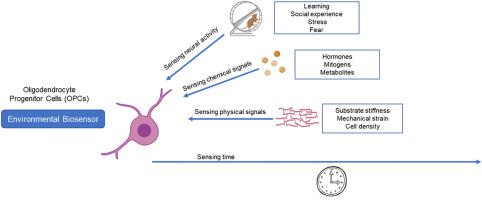Seminars in Cell & Developmental Biology ( IF 6.2 ) Pub Date : 2020-10-19 , DOI: 10.1016/j.semcdb.2020.09.012 David K Dansu 1 , Sami Sauma 2 , Patrizia Casaccia 3

|
The past decade has seen an important revision of the traditional concept of the role and function of glial cells. From “passive support” for neurons, oligodendrocyte lineage cells are now recognized as metabolic exchangers with neurons, a cellular interface with blood vessels and responders to gut-derived metabolites or changes in the social environment. In the developing brain, the differentiation of neonatal oligodendrocyte progenitors (nOPCs) is required for normal brain function. In adulthood, the differentiation of adult OPCs (aOPCs) serves an important role in learning, behavioral adaptation and response to myelin injury. Here, we propose the concept of OPCs as environmental biosensors, which “sense” chemical and physical stimuli over time and adjust to the new challenges by modifying their epigenome and consequent transcriptome. Because epigenetics defines the ability of the cell to “adapt” gene expression to changes in the environment, we propose a model of OPC differentiation resulting from time-dependent changes of the epigenomic landscape in response to declining mitogens, raising hormone levels, neuronal activity, changes in space constraints or stiffness of the extracellular matrix. We propose that the intrinsically different functional properties of aOPCs compared to nOPCs result from the accrual of “epigenetic memories” of distinct events, which are “recorded” in the nuclei of OPCs as histone and DNA marks, defining a “unique epigenomic landscape” over time.
中文翻译:

少突胶质细胞祖细胞作为环境生物传感器
过去十年,神经胶质细胞的作用和功能的传统概念发生了重要修订。从对神经元的“被动支持”开始,少突胶质细胞谱系细胞现在被认为是神经元的代谢交换者、与血管的细胞界面以及对肠道衍生代谢物或社会环境变化的反应者。在发育中的大脑中,新生儿少突胶质细胞祖细胞 (nOPC) 的分化是正常大脑功能所必需的。在成年期,成体 OPC (aOPC) 的分化在学习、行为适应和髓磷脂损伤反应中发挥重要作用。在这里,我们提出了OPC作为环境生物传感器的概念,它随着时间的推移“感知”化学和物理刺激,并通过修改其表观基因组和随后的转录组来适应新的挑战。由于表观遗传学定义了细胞“适应”基因表达以适应环境变化的能力,因此我们提出了一种 OPC 分化模型,该模型是由于表观基因组景观随时间的变化而发生的变化,以响应有丝分裂原的减少、激素水平的升高、神经元活动、空间限制或细胞外基质刚度的变化。我们认为,aOPC 与 nOPC 相比具有本质上不同的功能特性,是由于不同事件的“表观遗传记忆”的积累所致,这些记忆以组蛋白和 DNA 标记的形式“记录”在 OPC 的细胞核中,从而定义了“独特的表观基因组景观”。时间。











































 京公网安备 11010802027423号
京公网安备 11010802027423号